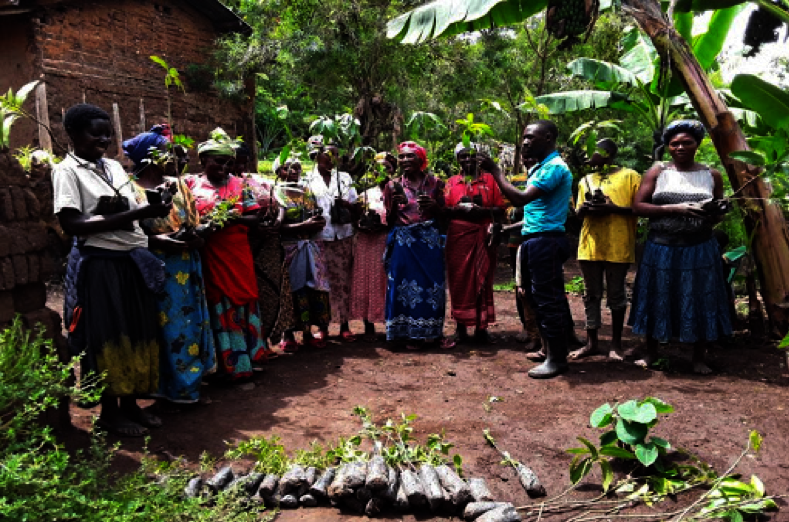By Doreen Kansiime and Robin Marsh | Project Leader; Project Advisor
The last few months have been very active at RCRA with 1,000 Women’s Gardens for Health and Nutrition. On April 7th, RCRA and the 1,000 Women’s Gardens for Health and Nutrition carried out a successful ‘Building Climate Resilience’ workshop with 40 participants, the majority women gardeners (see photo below). Villagers in Kasese District are already experiencing changes in the climate that affect their livelihoods and health, such as delayed rains, irregular rainy seasons, and hotter temperatures. If no actions are taken, these changes will lead to increasingly negative outcomes. Workshop presenters – faculty from Mountains of the Moon University and RCRA staff explained in the local language both the causes and impacts of local climate change. Participants learned and discussed how their own actions to create and manage agroecological gardens, grow trees, harvest rainwater, plan their families, reduce plastic use, and improve nutrition can mitigate climate change impacts and build resilience to withstand shocks associated with climate change. This workshop serves as a model for other sub-counties throughout Uganda to involve local communities in understanding and confronting climate change.
In March, we carried out a short survey of over 150 households to gather information on gardeners’ needs and desire for tree planting and their preferred varieties, as well as on water sources and drought vulnerability. With this information the team was able to distribute three to four desired tree seedlings to participating households, and ensure they have the water, soil and training to manage care of the trees. In all, 205 households received trees as demand was particularly high in the more urban sub-counties where there are few trees. The project wanted to meet this need with available resources from GlobalGiving. Trees were sourced from local nurseries and transported by motorbike. Varieties are: orange (grafted), mango, tomato tree, jackfruit, pawpaw (papaya), and neem (for medicine and botanical pesticide).
Team members demonstrated how to dig the tree holes, mulch the tree seedlings and protect from animals with simple fencing (see photos below), as well as discuss the multiple benefits of trees for family health and the environment, such as providing nutritious fruit, wood for cookstoves, fodder for animals, shade from the heat for plants and humans, income and carbon storage. Community gardens will similarly receive tree seedlings and training through the end of May. Tree distribution was timed to coincide with the rainy season to give the trees a good start before watering will be required.
The 1,000 Women’s Gardens team is currently carrying out a second key climate resilience activity - the distribution of water harvesting tanks to 50 families identified as having greatest vulnerability to water scarcity during the dry season. Families are placing their tanks where rain runoff is most available (e.g. adjacent to roofs), and some will be filled with creek or tap water as well, so that when the long dry season comes there will be water to maintain their gardens and trees. Families desired portable tanks that can be moved inside when filled up, for protection. The blue tanks are labeled “Strengthening Families and Climate Resilience in Western Uganda” (see photos below). Tanks were trucked in by RCRA and distributed to groups of beneficiaries after a discussion about their use, benefits and maintenance. Sub-county government officials joined in. The project will be returning a month or two into the dry season to see how effective rain harvesting has been for these 50 families, and whether the activity should be expanded.
Phase 3 of 1,000 Women’s Gardens is also well underway, with 75 new mother gardens and six community gardens planted with tomatoes, pumpkin, local kale and spinach, eggplant, African eggplant, spring onion, cabbage and sweet potato. Women are learning the importance of raised beds and mulching for soil and water conservation (see photos below). The timing has been good with the rainy season still on. Trainings on organic pest management are set to take place in early June.
The next major activity will be integrating education and discussion on reproductive health topics by peer educators. Gatherings will take place during harvest time in the community gardens. Sexual and reproductive health is another important element of the project’s climate resilience strategy, especially for young mothers. More on this activity in the next progress report! We at RCRA and 1,000 Women’s Gardens for Health and Nutrition recognize and appreciate the support of each and every one of the GlobalGiving donors. We could not do any of this without you!
Links:
Project reports on GlobalGiving are posted directly to globalgiving.org by Project Leaders as they are completed, generally every 3-4 months. To protect the integrity of these documents, GlobalGiving does not alter them; therefore you may find some language or formatting issues.
If you donate to this project or have donated to this project, you can receive an email when this project posts a report. You can also subscribe for reports without donating.
Support this important cause by creating a personalized fundraising page.
Start a Fundraiser





